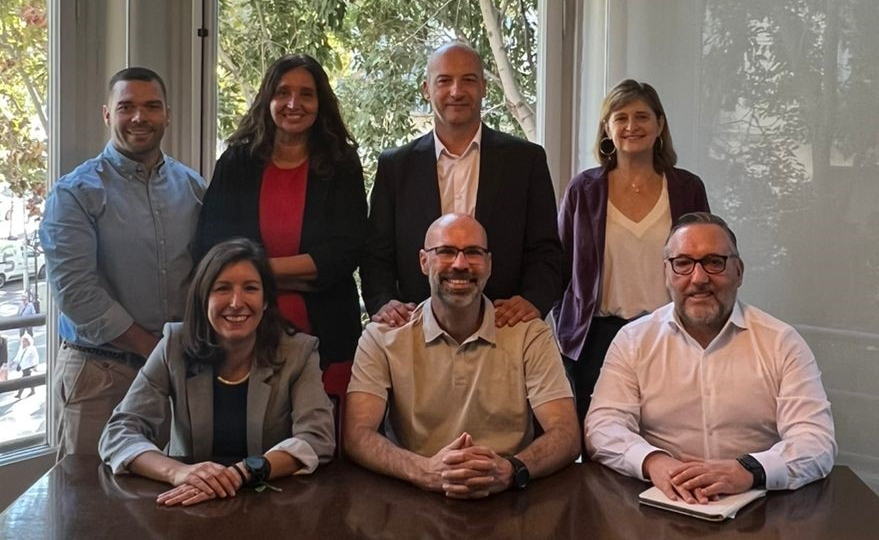
UB and UPF create OrganAID Holdings, a spin-off dedicated to testing drugs through the combination of organoids and artificial intelligence
Developing drugs for neurological diseases presents major challenges. Eighty percent of medications do not pass the advanced phases of clinical trials in patients, and the average cost per drug development exceeds 2.6 billion dollars. The need to reduce and replace the use of animal experimentation models, as well as the inadequate selection of tissues and pathophysiologies, hinders the efficiency of the process.
In this context, the University of Barcelona (UB) and Pompeu Fabra University (UPF) have promoted the creation of OrganAID Holdings, a biotechnology spin-off that develops a drug-testing platform using organoids and artificial intelligence (AI).
OrganAID Holdings uses brain organoids obtained from patient cells and combines them with a predictive AI tool trained with an extensive database of brain organoid images. Organoids are an advanced 3D cell culture that reproduces, in a simplified way, the physiology of a human organ.
This makes it possible to perform neurological toxicity and drug efficacy analyses for specific diseases and test medications in vitro for untreated neurological conditions, in a personalized way for each patient.
As explained by Dr. Sandra Acosta, professor at the Faculty of Medicine of the University of Barcelona and one of the researchers driving the project, “right now there are enough drugs targeting the central nervous system, but we do not have good models that accurately reproduce the neuronal conditions of a human brain. This technology allows us to get much closer to clinical reality and do so in a personalized way for each patient.”
Thanks to its versatility, OrganAID’s technology is not only applicable to neurological diseases but also to pathologies of genetic or oncological origin. The team is exploring new projects focused on colon and brain cancer, taking advantage of organoids’ capacity to model tissues with relative ease and provide relevant information for the development of new treatments.
A paradigm shift
One of the key elements in making knowledge transfer a reality has been the support received through the F2I (Innovation Promotion Fund) program of the Bosch i Gimpera Foundation and the University of Barcelona, as well as through the UPF INNOValora program of Pompeu Fabra University and the María de Maeztu program of the Ministry of Science, Innovation and Universities, along with other grants such as those from AGAUR and the CaixaImpulse call of the “la Caixa” Foundation.
“This whole process would not have been possible without these instruments. The strength of the project comes, in large part, from solid funding and the recognition of institutions such as the University itself, the Generalitat or the ‘la Caixa’ Foundation,” says Dr. Acosta. “Thanks to these funds, we have been able to conduct market studies and patentability analyses — steps that are not usually covered in basic research and that have been decisive in moving forward.”
The researcher also highlights the value of the transfer process and the decision to create the spin-off: “it has been a long and complex journey, but if we did not believe that this technology could represent a paradigm shift, we would not have committed to it. I am very satisfied to have reached this point, to have licensed the technology and to have found a solid business team that ensures the knowledge can truly reach the market. The combination of research and business management can be key to success.”
The Dean of the Faculty of Medicine of the University of Barcelona, Dr. Antoni Trilla, praised the initiative: “OrganAID Holdings is a clear example of the transformative potential of university research when combined with care, innovation and the willingness to directly impact society. This spin-off strengthens the University of Barcelona’s commitment to knowledge transfer and value generation, and reinforces UB’s role as one of the drivers of scientific, economic and social progress.”
A multidisciplinary team
The founding team consists of multidisciplinary profiles that combine scientific excellence and business experience. Dr. Sandra Acosta is a professor at the Faculty of Medicine of the University of Barcelona, an associate scientist at Sant Joan de Déu Hospital and the Pasqual Maragall Foundation, and has more than fifteen years of experience in modeling neurological disorders in vitro, specializing in neurodegeneration, genomics and organoids.
In the business field, the company’s CEO, Víctor Bañares, has an extensive and notable professional career. He is the co-founder of Vueling Airlines and Iryo Alta Velocidad, positions from which he has contributed to the strategic and innovative growth of these organizations.
For his part, Toni Villar, CCO, brings solid experience in team leadership and business development in international companies such as BNP Paribas, Tradisa, Kuehne&Nagel and ID Logistics. Óscar Lao, a scientist at the Spanish National Research Council (CSIC) and professor at ESCI-UPF, is a bioinformatician and geneticist with more than twenty years of experience in developing tools to understand human genetics.

